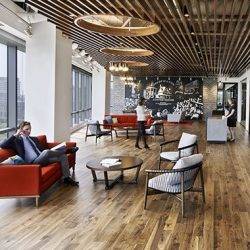January 30, 2018
Public sector procurement must foster digital innovation and growth says report
 If the Government is to deliver its plans of driving digital transformation to improve the UK’s public services it must make a step change in procurement within central government and the wider public sector. That is one of the main findings of Procuring the Smarter State: key steps to promote innovation and growth in the public sector, published today by techUK. The Government spent more than £12.2bn with SMEs in 2015/16 and thousands more tech SMEs have signed up to sell their services to Government in the last year through agreements like G-Cloud and Digital Outcomes and Services. But the Government needs to do more if it is to reach its aspiration of spending one pound in every three with SMEs by 2022. This new report sets out how procurement can act as a tool for Government to deliver its vision for the future of public services and use public sector procurement to help foster innovation in the supplier community.
If the Government is to deliver its plans of driving digital transformation to improve the UK’s public services it must make a step change in procurement within central government and the wider public sector. That is one of the main findings of Procuring the Smarter State: key steps to promote innovation and growth in the public sector, published today by techUK. The Government spent more than £12.2bn with SMEs in 2015/16 and thousands more tech SMEs have signed up to sell their services to Government in the last year through agreements like G-Cloud and Digital Outcomes and Services. But the Government needs to do more if it is to reach its aspiration of spending one pound in every three with SMEs by 2022. This new report sets out how procurement can act as a tool for Government to deliver its vision for the future of public services and use public sector procurement to help foster innovation in the supplier community.











 Financial services organisations are reducing the amount of commercial office space they require as they adopt more flexible work styles. This is according to a new report from HOK’s US team,
Financial services organisations are reducing the amount of commercial office space they require as they adopt more flexible work styles. This is according to a new report from HOK’s US team, 












 Managers are working an extra 44 days a year over and above their contracted hours, up from 40 days in 2015. These long hours are taking their toll, causing a surge in sick leave amongst managers suffering from stress and mental ill health, claims the Chartered Management Institute (CMI), which is calling on UK employers to provide greater support. Long hours and constant communication are having a detrimental effect on the wellbeing of managers it argues resulting in one in ten managers taking time off for mental health in the last year, and for those who do take time out, it’s for an average of 12 days. Of the 1,037 managers surveyed for the report, the average boss puts in an extra day each week. This is an extra 7.5 hours beyond their contracted weekly hours (44.4 hours actual compared to 37.3 contracted), adding up to an extra 43.8 days over the course of the year. This is up from 39.6 days in 2015. The rising gap between contracted and actual hours of work is in addition to an ‘always on’ digital culture, with 59 percent of managers saying they ‘frequently’ check their emails outside of work – up from 54 percent in 2015.
Managers are working an extra 44 days a year over and above their contracted hours, up from 40 days in 2015. These long hours are taking their toll, causing a surge in sick leave amongst managers suffering from stress and mental ill health, claims the Chartered Management Institute (CMI), which is calling on UK employers to provide greater support. Long hours and constant communication are having a detrimental effect on the wellbeing of managers it argues resulting in one in ten managers taking time off for mental health in the last year, and for those who do take time out, it’s for an average of 12 days. Of the 1,037 managers surveyed for the report, the average boss puts in an extra day each week. This is an extra 7.5 hours beyond their contracted weekly hours (44.4 hours actual compared to 37.3 contracted), adding up to an extra 43.8 days over the course of the year. This is up from 39.6 days in 2015. The rising gap between contracted and actual hours of work is in addition to an ‘always on’ digital culture, with 59 percent of managers saying they ‘frequently’ check their emails outside of work – up from 54 percent in 2015.
 Three in 10 business professionals think most of their meetings are pointless and nearly half (48 percent) of UK business people admit to having dozed off in a meeting claims global research by Barco ClickShare. The study revealed the true extent of our shared dislike for business meetings, which many respondents believe are poorly run at best or, at worst, completely pointless. Nearly a third of respondents globally said they found less than half of their meetings to be useful, while 30 percent also said they had dozed off in a meeting before. The UK, in fact, led the way in the asleep-in-meeting stakes, with nearly half (48 percent) of all UK respondents saying they’d fallen asleep in meetings. Checking emails and social media during meetings was also extremely common and another indication of disengagement and distraction. Over 70 percent of people said they regularly checked emails during meetings, while 37 percent access social media.
Three in 10 business professionals think most of their meetings are pointless and nearly half (48 percent) of UK business people admit to having dozed off in a meeting claims global research by Barco ClickShare. The study revealed the true extent of our shared dislike for business meetings, which many respondents believe are poorly run at best or, at worst, completely pointless. Nearly a third of respondents globally said they found less than half of their meetings to be useful, while 30 percent also said they had dozed off in a meeting before. The UK, in fact, led the way in the asleep-in-meeting stakes, with nearly half (48 percent) of all UK respondents saying they’d fallen asleep in meetings. Checking emails and social media during meetings was also extremely common and another indication of disengagement and distraction. Over 70 percent of people said they regularly checked emails during meetings, while 37 percent access social media.









